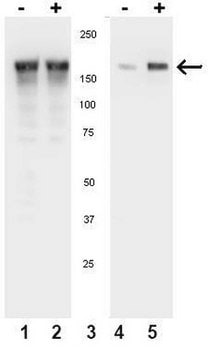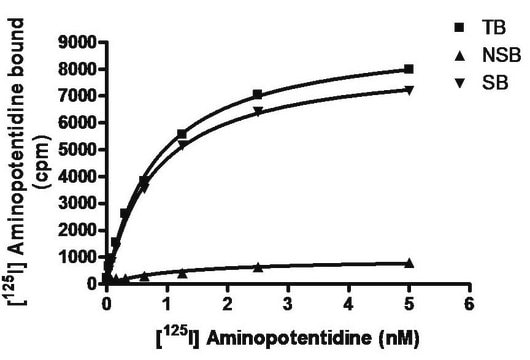09-310
Anti-phospho-EGFR (Tyr1069) Antibody
from rabbit, purified by affinity chromatography
Synonym(e):
Receptor tyrosine-protein kinase ErbB-1, avian erythroblastic leukemia viral (v-erb-b) oncogene homolog, cell growth inhibiting protein 40, cell proliferation-inducing protein 61, epidermal growth factor receptor, epidermal growth factor receptor (avian
About This Item
Empfohlene Produkte
Biologische Quelle
rabbit
Qualitätsniveau
Antikörperform
affinity isolated antibody
Antikörper-Produkttyp
primary antibodies
Klon
polyclonal
Aufgereinigt durch
affinity chromatography
Speziesreaktivität
human
Speziesreaktivität (Voraussage durch Homologie)
primate (based on 100% sequence homology), rat (based on 100% sequence homology), mouse (based on 100% sequence homology), pig (based on 100% sequence homology), horse (based on 100% sequence homology)
Methode(n)
ELISA: suitable
immunocytochemistry: suitable
western blot: suitable
NCBI-Hinterlegungsnummer
UniProt-Hinterlegungsnummer
Versandbedingung
wet ice
Posttranslationale Modifikation Target
phosphorylation (pTyr1069)
Angaben zum Gen
horse ... Egfr(100067755)
human ... EGFR(1956)
mouse ... Egfr(13649)
pig ... Egfr(397070)
rat ... Egf(25313)
Allgemeine Beschreibung
Spezifität
Immunogen
Anwendung
Apoptose & Krebs
Zelluläre Signaltransduktion
Kinasen & Phosphatasen
Qualität
Western Blot Analysis:
1:1,000 dilution of this antibody detected Tyr1069 phosphorylated EGFR on 10 g of EGF treated A431 lysates.
Zielbeschreibung
Verlinkung
Physikalische Form
Lagerung und Haltbarkeit
Handling Recommendations: Upon receipt, and prior to removing the cap, centrifuge the vial and gently mix the solution.
Hinweis zur Analyse
Untreated and EGF treated A431 lysates
Haftungsausschluss
Sie haben nicht das passende Produkt gefunden?
Probieren Sie unser Produkt-Auswahlhilfe. aus.
Lagerklassenschlüssel
12 - Non Combustible Liquids
WGK
WGK 1
Flammpunkt (°F)
Not applicable
Flammpunkt (°C)
Not applicable
Analysenzertifikate (COA)
Suchen Sie nach Analysenzertifikate (COA), indem Sie die Lot-/Chargennummer des Produkts eingeben. Lot- und Chargennummern sind auf dem Produktetikett hinter den Wörtern ‘Lot’ oder ‘Batch’ (Lot oder Charge) zu finden.
Besitzen Sie dieses Produkt bereits?
In der Dokumentenbibliothek finden Sie die Dokumentation zu den Produkten, die Sie kürzlich erworben haben.
Unser Team von Wissenschaftlern verfügt über Erfahrung in allen Forschungsbereichen einschließlich Life Science, Materialwissenschaften, chemischer Synthese, Chromatographie, Analytik und vielen mehr..
Setzen Sie sich mit dem technischen Dienst in Verbindung.








